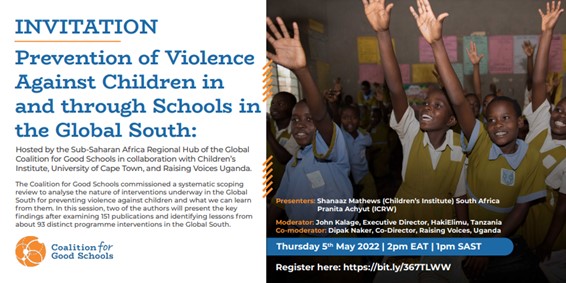Sub-Saharan Africa Hub Seminar Series
The global Coalition for Good Schools and the Sub-Saharan Africa Regional Hub has completed a 3-part seminar series unpacking our evidence review on violence prevention in and through schools.
From 5 May to 13 July, the Sub-Saharan Africa Regional Hub hosted a 3-part discussion to explore evidence and practitioner experience around the prevention of violence against children in and through schools in the Global South. This series unpacked findings from our recent evidence review, shared concrete examples of successful interventions, and formally introduced the Sub-Saharan Africa Regional Hub for the Coalition for Good Schools.
Through this series of engaging events, participants discussed and shared findings of the Coalition’s evidence review on violence prevention in and through schools, built consensus and highlighted promising approaches with a focus on Sub-Saharan Africa, and developed a direction for both regional and global communities of practice through the Coalition for Good Schools and its three regional hubs.
The first session, co-hosted by John Kalage (HakiElimu) and Dipak Naker (Raising Voices) featured an in-depth discussion with the authors of the evidence review, Shanaaz Matthews (Children’s Institute at University of Cape Town) and Pranita Achyut (ICRW). The review synthesizes evidence from violence prevention programmes evaluated and implemented in and through schools in Global South and what we can learn from them.

“Practitioners on the frontline, people who are on the ground implementing these ideas, are crucial – they are the drivers of how we solve these problems and we need to invest in them.”
Dipak Naker, Co-Founder Coalition for Good Schools
Discussants explored how multi-component interventions – strategies that engage multiple stakeholders to address the entire school ecosystem in which children are situated – were found to be more successful in preventing violence in schools. Whole school approaches engaging learners, teachers, administrators and parents, have been shown to have profound impacts on the operational culture of the school. Group-based interventions that provide safe spaces for students to express themselves and question each other have been shown to empower learners to discuss how violence affects their lives.
The authors highlighted how teachers play a key role in effective interventions and should be empowered to improve behavior towards their learners, and must be supported with the tools and practices they need to prevent violence in their schools. Development of all of these approaches should be informed by first-hand, in-depth understanding of the context, and intervention design should remain iterative in nature and be embedded with a culture of learning and transformation.
“Thinking about violence is thinking about power, and changing power dynamics. We need to be working with teachers, educators, and school governing bodies to think about how to change their relationships with children. Multi-component interventions focusing on engaging multiple stakeholders with an investment in structural changes increase sustainability.”
Shanaaz Matthews, Co-Founder, Coalition for Good Schools
The authors of the report explored the challenges faced in approaching such a colossal task of pulling together all the available evidence on VAC prevention methodologies in schools. Pranita Achyut discussed the bias inherent in peer-reviewed publications having the power to dictate what we consider to be rigorous knowledge, and how focus on these sources leaves out a vast wealth of practitioner knowledge. There is strong need to include insights captured in other forms of documentation, particularly from those working to prevent violence in the Global South, and to create spaces for South-based practitioners to come together and share their ideas with proper investment and support.
There was further discussion of the complexity of the issue of violence in children’s lives, and how working with teachers, school administrators, community members and learners themselves is critical to address this. The authors further discussed how truly transformative approaches – and particularly those addressing the marginalisation of girls – requires focused attention when engaging in the critical work around power required to prevent violence in all its forms.
“When a programme is designed to engage both girls and boys and not recognizing the marginalisation of girls, in a way we are further marginalising them and excluding them from the programme. ”
Pranita Achyut, Co-Founder, Coalition for Good Schools
Session two on 16th June provided practitioners a platform to share insights from successful programmes. Selected speakers discussed aspects of their violence prevention interventions that have been identified as successful throughout the region.
We heard from Raising Voices about their work to scale the Good School Toolkit to over 1,000 schools in Uganda. The Good School Toolkit takes an evidence-backed whole-school approach to transform the operational culture of schools. We heard from No Means No Worldwide on their work to transform knowledge, attitudes and life-skills through IMpower in Kenya, Malawi and Uganda, and challenging gender norms and promoting equitable relationships through Your Moment of Truth in Kenya. We also heard from Population Council on their work providing psycho-social support for children, parents and teachers through “Asking and Telling” in Kenya and creating safe environments through the Zero Tolerance model in South Africa
The final session on 13th July convened practitioners and decision-makers from the African Child Policy Forum, the Global Partnership to End VAC, Safe to Learn, Raising Voices, HakiElimu, Children’s Institute, Child Protection Network, Aulas en Paz and others to discuss how we can carry this work forward across the Global South and in partnership with Global North-led initiatives. Members of the global Coalition for Good Schools deliberated on how to amplify voices of Global South practitioners on the global stage, what the central objectives of the Coalition are and what it is doing, and how to join and connect with the Coalition and other members working to prevent VAC in and through schools.
